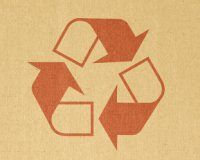

Northern Ireland's councils have recently exceeded a 50% recycling rate, and in doing so have subsequently hit their targets for 2020 nearly 18 months early.
Data from July 2018 to June 2019 has shown that households in the region are busy recycling and composting more waste than ever before - the exact rate recorded as 50.4%. In response, the landfill rate has been shown to fall, presenting a figure of only 24% for the last quarter. Local Authorities collected 265,181 tonnes of municipal waste in between April and June, this is 2.9% less than in the same three months of 2018. In specific regions, Mid Ulster saw the highest rate of recycling, for 63.2%, and whilst Derry City and Strabane's rate was the lowest among the Northern Irish Councils, it was still a result of 45.5%.
The Assistant Director of Environmental Policy at Northern Ireland's Department of Agricultural, Environment and Rural Affairs (DAERA), Owen Lyttle, believes the results were a huge achievement for everyone that was involved. He further explained, "Achieving this result reflects a tremendous effort by all those involved in the waste management sector, local and central government, reprocessing sector, the voluntary sector and of course the public." He added, "Together we have surpassed our strategy target of recycling 50% of our household waste by the end of 2020, putting us in a good place now to focus our efforts on addressing the bigger challenges of climate change.
The figures also show that Northern Ireland's residual waste is increasingly being sent to energy recovery facilities, instead of being sent to landfill. The energy recovery rate was higher, up to 18.7% from 17.1% reported for the previous year. For most councils, energy recovery for mixed residual waste accounted for a greater proportion of total energy recovery than specific streams such as wood. They only saw a landfill rate increase in Mid and East Antrim, where it increased only by 1.2%.
The Director of Bryson Recycling, Eric Randall, has described the results as a "real achievement" for the country's waste and recycling industry. Their company collects and processes materials from 60% of the homes in Northern Ireland, and having met their targets, Mr Randall has now said that the focus needs to shift. They are instead looking to focus more on the quality of the material, and the value that it will have for the Northern Ireland economy. It is mainly about how to derive both social and economic benefits from the production of waste.
In July, DAERA announced £23 million of investment, into schemes to make recycling easier, as their household recycling rate overtook England's for the first time.